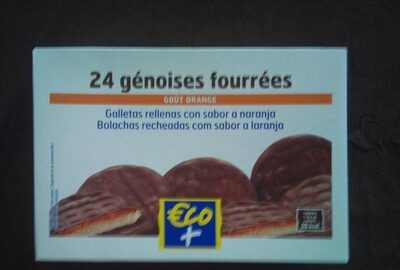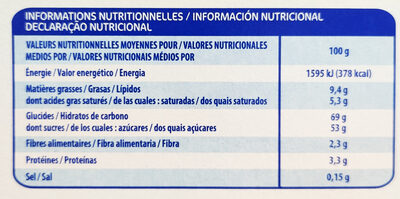Help us make food transparency the norm!
As a non-profit organization, we depend on your donations to continue informing consumers around the world about what they eat.
The food revolution starts with you!
Génoises Fourrées Orange - Eco+ - 300g
Génoises Fourrées Orange - Eco+ - 300g
This product page is not complete. You can help to complete it by editing it and adding more data from the photos we have, or by taking more photos using the app for Android or iPhone/iPad. Thank you!
×
Barcode: 3450970023931 (EAN / EAN-13)
Common name: Genoises Fourrées Orange
Quantity: 300g
Brands: Eco+
Categories: Snacks, Sweet snacks, Biscuits and cakes, Jaffa cakes
Link to the product page on the official site of the producer: http://www.ecoplusinfo.com
Stores: E.Leclerc
Countries where sold: France
Matching with your preferences
Health
Ingredients
-
30 ingredients
French: Sirop de glucose-fructose; sucre ; chocolat noir 15% (pâte de cacao, sucre, beurre de cacao, émulsifiant : E322 (soja), arôme naturel de vanille); farine de blé; jus d'orange à base de concentré 5,5%; œufs entiers ; stabilisant : E420; graisse de palme; amidon de blé; gélifiant : E440; acidifiant : E330; amidon de tapioca ; poudres à lever: E503, E500; arôme naturel d'orange; émulsifiant : E471; correcteur d'acidité : E331; sel. Traces de fruits à coque et lait.Allergens: Eggs, Gluten, SoybeansTraces: Milk, Nuts
Food processing
-
Ultra processed foods
Elements that indicate the product is in the 4 - Ultra processed food and drink products group:
- Additive: E322 - Lecithins
- Additive: E420 - Sorbitol
- Additive: E440 - Pectins
- Additive: E471 - Mono- and diglycerides of fatty acids
- Ingredient: Emulsifier
- Ingredient: Flavouring
- Ingredient: Gelling agent
- Ingredient: Glucose
Food products are classified into 4 groups according to their degree of processing:
- Unprocessed or minimally processed foods
- Processed culinary ingredients
- Processed foods
- Ultra processed foods
The determination of the group is based on the category of the product and on the ingredients it contains.
Additives
-
E322 - Lecithins
Lecithins are natural compounds commonly used in the food industry as emulsifiers and stabilizers.
Extracted from sources like soybeans and eggs, lecithins consist of phospholipids that enhance the mixing of oil and water, ensuring smooth textures in various products like chocolates, dressings, and baked goods.
They do not present any known health risks.
-
E330 - Citric acid
Citric acid is a natural organic acid found in citrus fruits such as lemons, oranges, and limes.
It is widely used in the food industry as a flavor enhancer, acidulant, and preservative due to its tart and refreshing taste.
Citric acid is safe for consumption when used in moderation and is considered a generally recognized as safe (GRAS) food additive by regulatory agencies worldwide.
-
E331 - Sodium citrates
Sodium citrate: Sodium citrate may refer to any of the sodium salts of citrate -though most commonly the third-: Monosodium citrate Disodium citrate Trisodium citrateThe three forms of the salt are collectively known by the E number E331. Sodium citrates are used as acidity regulators in food and drinks, and also as emulsifiers for oils. They enable cheeses to melt without becoming greasy.Source: Wikipedia
-
E420 - Sorbitol
Sorbitol: Sorbitol --, less commonly known as glucitol --, is a sugar alcohol with a sweet taste which the human body metabolizes slowly. It can be obtained by reduction of glucose, which changes the aldehyde group to a hydroxyl group. Most sorbitol is made from corn syrup, but it is also found in nature, for example in apples, pears, peaches, and prunes. It is converted to fructose by sorbitol-6-phosphate 2-dehydrogenase. Sorbitol is an isomer of mannitol, another sugar alcohol; the two differ only in the orientation of the hydroxyl group on carbon 2. While similar, the two sugar alcohols have very different sources in nature, melting points, and uses.Source: Wikipedia
-
E440 - Pectins
Pectins (E440) are natural carbohydrates, predominantly found in fruits, that act as gelling agents in the food industry, creating the desirable jelly-like texture in jams, jellies, and marmalades.
Pectins stabilize and thicken various food products, such as desserts, confectioneries, and beverages, ensuring a uniform consistency and quality.
Recognized as safe by various health authorities, pectins have been widely used without notable adverse effects when consumed in typical dietary amounts.
-
E471 - Mono- and diglycerides of fatty acids
Mono- and diglycerides of fatty acids (E471), are food additives commonly used as emulsifiers in various processed foods.
These compounds consist of glycerol molecules linked to one or two fatty acid chains, which help stabilize and blend water and oil-based ingredients. E471 enhances the texture and shelf life of products like margarine, baked goods, and ice cream, ensuring a smooth and consistent texture.
It is generally considered safe for consumption within established regulatory limits.
-
E500 - Sodium carbonates
Sodium carbonates (E500) are compounds commonly used in food preparation as leavening agents, helping baked goods rise by releasing carbon dioxide when they interact with acids.
Often found in baking soda, they regulate the pH of food, preventing it from becoming too acidic or too alkaline. In the culinary world, sodium carbonates can also enhance the texture and structure of foods, such as noodles, by modifying the gluten network.
Generally recognized as safe, sodium carbonates are non-toxic when consumed in typical amounts found in food.
-
E503 - Ammonium carbonates
Ammonium carbonate: Ammonium carbonate is a salt with the chemical formula -NH4-2CO3. Since it readily degrades to gaseous ammonia and carbon dioxide upon heating, it is used as a leavening agent and also as smelling salt. It is also known as baker's ammonia and was a predecessor to the more modern leavening agents baking soda and baking powder. It is a component of what was formerly known as sal volatile and salt of hartshorn.Source: Wikipedia
Ingredients analysis
-
Palm oil
Ingredients that contain palm oil: Palm fat
-
Non-vegan
Non-vegan ingredients: Whole egg
-
Maybe vegetarian
Ingredients that may not be vegetarian: E322, Natural orange flavouring, E471
-
Details of the analysis of the ingredients
fr: Sirop de glucose-fructose, sucre, chocolat noir 15% (pâte de cacao, sucre, beurre de cacao, émulsifiant (e322), arôme naturel de vanille), farine de blé, jus d'orange à base de concentré 5.5%, œufs entiers, stabilisant (e420), graisse de palme, amidon de blé, gélifiant (e440), acidifiant (e330), amidon de tapioca, poudres à lever (e503), e500, arôme naturel d'orange, émulsifiant (e471), correcteur d'acidité (e331), sel- Sirop de glucose-fructose -> en:glucose-fructose-syrup - vegan: yes - vegetarian: yes - ciqual_food_code: 31077 - percent_min: 15 - percent_max: 59
- sucre -> en:sugar - vegan: yes - vegetarian: yes - ciqual_proxy_food_code: 31016 - percent_min: 15 - percent_max: 37
- chocolat noir -> en:dark-chocolate - vegan: maybe - vegetarian: yes - ciqual_proxy_food_code: 31074 - percent_min: 15 - percent: 15 - percent_max: 15
- pâte de cacao -> en:cocoa-paste - vegan: yes - vegetarian: yes - ciqual_proxy_food_code: 16030 - percent_min: 3 - percent_max: 15
- sucre -> en:sugar - vegan: yes - vegetarian: yes - ciqual_proxy_food_code: 31016 - percent_min: 0 - percent_max: 7.5
- beurre de cacao -> en:cocoa-butter - vegan: yes - vegetarian: yes - ciqual_food_code: 16030 - percent_min: 0 - percent_max: 5
- émulsifiant -> en:emulsifier - percent_min: 0 - percent_max: 3.75
- e322 -> en:e322 - vegan: maybe - vegetarian: maybe - percent_min: 0 - percent_max: 3.75
- arôme naturel de vanille -> en:natural-vanilla-flavouring - vegan: yes - vegetarian: yes - percent_min: 0 - percent_max: 3
- farine de blé -> en:wheat-flour - vegan: yes - vegetarian: yes - ciqual_proxy_food_code: 9410 - percent_min: 5.5 - percent_max: 15
- jus d'orange à base de concentré -> en:orange-juice-from-concentrate - vegan: yes - vegetarian: yes - ciqual_food_code: 2012 - percent_min: 5.5 - percent: 5.5 - percent_max: 5.5
- œufs entiers -> en:whole-egg - vegan: no - vegetarian: yes - ciqual_food_code: 22000 - percent_min: 0 - percent_max: 5.5
- stabilisant -> en:stabiliser - percent_min: 0 - percent_max: 5.5
- e420 -> en:e420 - vegan: yes - vegetarian: yes - percent_min: 0 - percent_max: 5.5
- graisse de palme -> en:palm-fat - vegan: yes - vegetarian: yes - from_palm_oil: yes - ciqual_proxy_food_code: 16129 - percent_min: 0 - percent_max: 5.5
- amidon de blé -> en:wheat-starch - vegan: yes - vegetarian: yes - ciqual_proxy_food_code: 9510 - percent_min: 0 - percent_max: 5.5
- gélifiant -> en:gelling-agent - percent_min: 0 - percent_max: 5.5
- e440 -> en:e440a - vegan: yes - vegetarian: yes - percent_min: 0 - percent_max: 5.5
- acidifiant -> en:acid - percent_min: 0 - percent_max: 5.5
- e330 -> en:e330 - vegan: yes - vegetarian: yes - percent_min: 0 - percent_max: 5.5
- amidon de tapioca -> en:tapioca - vegan: yes - vegetarian: yes - ciqual_proxy_food_code: 9510 - percent_min: 0 - percent_max: 5.5
- poudres à lever -> en:raising-agent - percent_min: 0 - percent_max: 5.36363636363636
- e503 -> en:e503 - vegan: yes - vegetarian: yes - percent_min: 0 - percent_max: 5.36363636363636
- e500 -> en:e500 - vegan: yes - vegetarian: yes - percent_min: 0 - percent_max: 4.91666666666667
- arôme naturel d'orange -> en:natural-orange-flavouring - vegan: maybe - vegetarian: maybe - percent_min: 0 - percent_max: 4.53846153846154
- émulsifiant -> en:emulsifier - percent_min: 0 - percent_max: 4.21428571428571
- e471 -> en:e471 - vegan: maybe - vegetarian: maybe - from_palm_oil: maybe - percent_min: 0 - percent_max: 4.21428571428571
- correcteur d'acidité -> en:acidity-regulator - percent_min: 0 - percent_max: 3.93333333333333
- e331 -> en:e331 - vegan: yes - vegetarian: yes - percent_min: 0 - percent_max: 3.93333333333333
- sel -> en:salt - vegan: yes - vegetarian: yes - ciqual_food_code: 11058 - percent_min: 0 - percent_max: 0.15
Nutrition
-
Poor nutritional quality
⚠ ️Warning: the amount of fruits, vegetables and nuts is not specified on the label, it was estimated from the list of ingredients: 5This product is not considered a beverage for the calculation of the Nutri-Score.
Positive points: 2
- Proteins: 2 / 5 (value: 3.3, rounded value: 3.3)
- Fiber: 2 / 5 (value: 2.3, rounded value: 2.3)
- Fruits, vegetables, nuts, and colza/walnut/olive oils: 0 / 5 (value: 5.5, rounded value: 5.5)
Negative points: 19
- Energy: 4 / 10 (value: 1595, rounded value: 1595)
- Sugars: 10 / 10 (value: 53, rounded value: 53)
- Saturated fat: 5 / 10 (value: 5.3, rounded value: 5.3)
- Sodium: 0 / 10 (value: 60, rounded value: 60)
The points for proteins are not counted because the negative points are greater or equal to 11.
Nutritional score: (19 - 2)
Nutri-Score:
-
Nutrient levels
-
Fat in moderate quantity (9.4%)
What you need to know- A high consumption of fat, especially saturated fats, can raise cholesterol, which increases the risk of heart diseases.
Recommendation: Limit the consumption of fat and saturated fat- Choose products with lower fat and saturated fat content.
-
Saturated fat in high quantity (5.3%)
What you need to know- A high consumption of fat, especially saturated fats, can raise cholesterol, which increases the risk of heart diseases.
Recommendation: Limit the consumption of fat and saturated fat- Choose products with lower fat and saturated fat content.
-
Sugars in high quantity (53%)
What you need to know- A high consumption of sugar can cause weight gain and tooth decay. It also augments the risk of type 2 diabetes and cardio-vascular diseases.
Recommendation: Limit the consumption of sugar and sugary drinks- Sugary drinks (such as sodas, fruit beverages, and fruit juices and nectars) should be limited as much as possible (no more than 1 glass a day).
- Choose products with lower sugar content and reduce the consumption of products with added sugars.
-
Salt in low quantity (0.15%)
What you need to know- A high consumption of salt (or sodium) can cause raised blood pressure, which can increase the risk of heart disease and stroke.
- Many people who have high blood pressure do not know it, as there are often no symptoms.
- Most people consume too much salt (on average 9 to 12 grams per day), around twice the recommended maximum level of intake.
Recommendation: Limit the consumption of salt and salted food- Reduce the quantity of salt used when cooking, and don't salt again at the table.
- Limit the consumption of salty snacks and choose products with lower salt content.
-
-
Nutrition facts
Nutrition facts As sold
for 100 g / 100 mlCompared to: Jaffa cakes Energy 1,595 kj
(378 kcal)- Fat 9.4 g -2% Saturated fat 5.3 g -1% Carbohydrates 69 g - Sugars 53 g +5% Fiber 2.3 g +5% Proteins 3.3 g -8% Salt 0.15 g -25% Fruits‚ vegetables‚ nuts and rapeseed‚ walnut and olive oils (estimate from ingredients list analysis) 5.5 %
Environment
-
Eco-Score C - Moderate environmental impact
⚠ ️Select a country in order to include the full impact of transportation.The Eco-Score is an experimental score that summarizes the environmental impacts of food products.→ The Eco-Score was initially developped for France and it is being extended to other European countries. The Eco-Score formula is subject to change as it is regularly improved to make it more precise and better suited to each country.Life cycle analysis
-
Average impact of products of the same category: B (Score: 75/100)
Category: Dried sponge cake filled with fruits and covered with chocolate
Category: Dried sponge cake filled with fruits and covered with chocolate
- PEF environmental score: 0.31 (the lower the score, the lower the impact)
- including impact on climate change: 1.83 kg CO2 eq/kg of product
Stage Impact Agriculture
74.4 %Processing
14.3 %Packaging
3.5 %Transportation
6.2 %Distribution
1.6 %Consumption
0.0 %
Bonuses and maluses
-
Missing origins of ingredients information
Malus: -5
⚠ ️ The origins of the ingredients of this product are not indicated.
If they are indicated on the packaging, you can modify the product sheet and add them.
If you are the manufacturer of this product, you can send us the information with our free platform for producers.
-
Ingredients that threatens species
Malus: -10
Contains palm oil
Tropical forests in Asia, Africa and Latin America are destroyed to create and expand oil palm tree plantations. The deforestation contributes to climate change, and it endangers species such as the orangutan, the pigmy elephant and the Sumatran rhino.
-
Missing packaging information for this product
Malus: -15
⚠ ️ The information about the packaging of this product is not filled in.⚠ ️ For a more precise calculation of the Eco-Score, you can modify the product page and add them.
If you are the manufacturer of this product, you can send us the information with our free platform for producers.
Eco-Score for this product
-
Impact for this product: C (Score: 45/100)
Product: Génoises Fourrées Orange - Eco+ - 300g
Life cycle analysis score: 75
Sum of bonuses and maluses: -30
Final score: 45/100
-
Carbon footprint
-
Equal to driving 0.9 km in a petrol car
183 g CO² per 100g of product
The carbon emission figure comes from ADEME's Agribalyse database, for the category: Dried sponge cake filled with fruits and covered with chocolate (Source: ADEME Agribalyse Database)
Stage Impact Agriculture
67.6 %Processing
13.0 %Packaging
6.0 %Transportation
12.3 %Distribution
1.1 %Consumption
0.0 %
Packaging
-
Missing packaging information for this product
⚠ ️ The information about the packaging of this product is not filled in.Take a photo of the recycling information Take a photo of the recycling information
Transportation
-
Origins of ingredients
Missing origins of ingredients information
⚠ ️ The origins of the ingredients of this product are not indicated.
If they are indicated on the packaging, you can modify the product sheet and add them.
If you are the manufacturer of this product, you can send us the information with our free platform for producers.Add the origins of ingredients for this product Add the origins of ingredients for this product
Threatened species
-
Contains palm oil
Drives deforestation and threatens species such as the orangutan
Tropical forests in Asia, Africa and Latin America are destroyed to create and expand oil palm tree plantations. The deforestation contributes to climate change, and it endangers species such as the orangutan, the pigmy elephant and the Sumatran rhino.
Report a problem
-
Incomplete or incorrect information?
Category, labels, ingredients, allergens, nutritional information, photos etc.
If the information does not match the information on the packaging, please complete or correct it. Open Food Facts is a collaborative database, and every contribution is useful for all.
Data sources
Product added on by kiliweb
Last edit of product page on by misterwhite.
Product page also edited by barnu, moon-rabbit, openfoodfacts-contributors, packbot, vaporous, yuka.Zlo4Q1Mva3Joc2c2b2NBR29SclQ2dUJTK3J5aUFEcWRMOEJBSVE9PQ, yuka.sY2b0xO6T85zoF3NwEKvlkFEf9T--m3GGgbuyXDamtmONqXReNNO4KfkIas.











